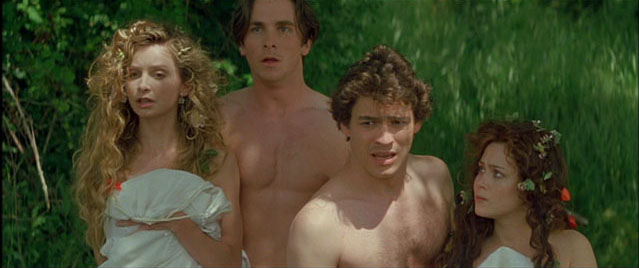
Midsummer Night’s Dream provides good instruction for the parents of teenagers. First of all, don’t think that you can tyrannically dictate your children’s choices (say, by threatening them with execution). On the other hand, they need guidelines and guidance. There’s no telling how they’ll behave once they are set loose in the forest of their desires.
If they are guys, they may change their partners every five minutes. If they are girls, they may sleep with donkeys.* Or at least choose inappropriate partners.
Today, I suppose, the autocratic father in the play (Egeus) would be an “abstinence only” advocate. Which makes me think of a great documentary I saw, The Education of Shelby Knox, about a Texas teenager who is trying to introduce sex education into her public school system. As she notes, “Life in Lubbock Texas taught me two things: one is that God loves you and you’re going to burn in hell. The other is that sex is the most awful, filthy thing on earth and you should save it for someone you love.”
Helping adolescents negotiate a time in life when hormones are surging through their bodies is a challenge for all societies. Shakespeare associates the condition with midsummer madness. Luckily, the society in the play has an enlightened leader who, while bound to uphold the ancient Athenian law, also can moderate between rules and freedom. By Act IV, Theseus has overridden Hermia’s father, allowing her to marry Lysander. But he also restores order through a triple wedding.
One has the impression in the play that sexual desire is dynamite that society is desperately trying to manage. Because this is a comedy, everything comes out all right. This is in contrast to, say, Antony and Cleopatra (or the presidency of Bill Clinton), where desire has catastrophic consequences. Puck is nature on the loose, a Cupid who plays fast and loose with his magic fairy juice, but he’s not the major nature sprite in the play. Ultimately Nature (Oberon) collaborates with Society (Theseus) to produce an orderly ending.
But before it does, look at the chaos nature causes. I sometimes ask my students whether the play’s relationship tangles could occur without the aid of Puck’s juice, and they relate instances that they’ve witnessed. Here’s a way to think of the four lovers: Before the play begins, Demetrius is in love with Helena. However, because Lysander loves Hermia, Demetrius decides that he’s in love with Hermia (he desires the one who is desired). After promising eternal love to Hermia, however, Lysander changes his mind and goes for Helena. Maybe he’s miffed because Hermia held out on him in the forest, insisting that he sleep at some distance from her when they are lost. Or maybe he becomes bored by whatever comes too easily. But because he changes, so does Demetrius, so they are again both in love with the same woman.
Meanwhile, my students see Helena as having a serious self esteem problem—she is ardent when rejected (to the point of masochism) but suspicious of people who say that they love her. And Hermia is the one who, accustomed to being adored, is smugly complacent until the men suddenly start looking elsewhere—at which point she goes ballistic. Next thing you know, there’s a guy fight and a girl fight.
Shakespeare gets the timing of the wedding wrong: at the beginning of the play, Theseus tells Hippolyta that they will get married in three days, but they instead get married the following day. But you can understand the reasons for the hurry: desire constantly threatens to override social restraint. In fact, the play that they choose to watch has one purpose and one purpose only: to somehow get them through the long hours between the ceremony and sex. Only something as inept and unintentionally funny as the players’ production of Pyramus and Thisbe will keep their minds off of what they really want to be doing.
Charlie Chaplin once wrote, “Long shot for comedy, close up for tragedy.” Midsummer Night’s Dream records our relationship traumas in long shot, through the eyes of an amused Puck. We can laugh now when we think back to our adolescent loves and losses, but they certainly felt tragic when we were experiencing them close up. This is important to remember when we help our own children manage this madness.
*I refer here to Polish scholar Jan Kott’s sensationalistic thesis that there’s a bestiality theme to be found within Midsummer Night’s Dream.

